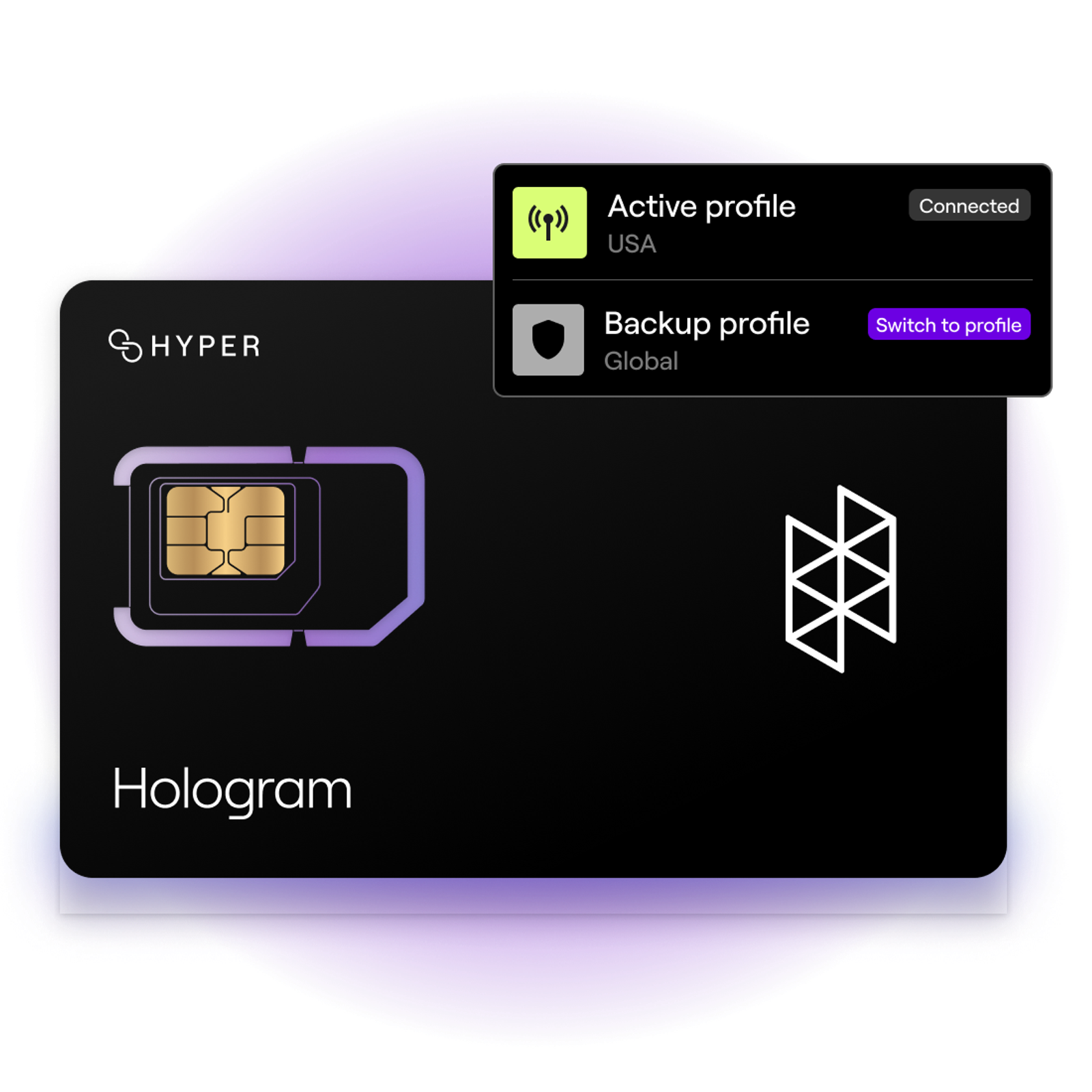IoT SIM cards in the UK: The complete 2025 guide

IoT SIM cards are a specialised cellular connectivity solution designed specifically for Internet of Things devices. With enhanced durability, multi-network coverage, and remote management capabilities, they offer features that standard SIM cards simply can't match, making them ideal for use cases across industries and geographies in the UK.
Background
IoT SIM card use cases across the UK
Tech dive
IoT SIM card technical specifications
Form factors for every UK application
Why eUICC and eSIM are the future of UK IoT connectivity
IoT SIM card security: Protecting UK infrastructure
Management and optimization
Managing your IoT SIM Card deployment
Common IoT SIM card challenges and British solutions
Selecting the best provider
Choosing your IoT SIM card provider in the UK
Hologram Hyper SIM: The premium IoT SIM card for the UK
The future of IoT SIM cards in Britain
Getting started with IoT SIM cards in the UK
What is an IoT SIM card?
An IoT SIM card (Internet of Things SIM) is a ruggedised Subscriber Identity Module (SIM) engineered specifically for machine-to-machine (M2M) communication and IoT device connectivity. Unlike the SIM cards in your mobile phone, IoT SIM cards are built to withstand harsh British weather, operate continuously for years, and provide seamless connectivity across multiple UK cellular networks including EE, Vodafone, O2, and Three.
Key differences: IoT SIM card vs regular SIM card
IoT SIM cards offer several critical advantages over standard consumer SIM cards that make them essential for British businesses deploying connected devices.
Durability
IoT SIM cards are engineered to withstand the challenging conditions found across Britain. These industrial-grade components operate reliably in extreme temperatures ranging from -40°C to +105°C, making them perfect for everything from Highland weather monitoring sensors to rooftop installations across London's urban landscape.
Long lifespans
Unlike consumer SIM cards that typically last around three years, IoT SIM cards are designed for long-term deployments with lifespans extending from 5 to 10 years or more. This enhanced durability comes from their resistance to corrosion, vibration, and moisture damage, ensuring they continue functioning whether deployed in a Scottish wind farm or a humid underground utility tunnel in Birmingham.
Reliable connectivity
The connectivity capabilities of IoT SIM cards far exceed those of standard mobile SIM cards. These specialised devices automatically switch between multiple cellular networks including 2G, 3G, 4G, 5G, NB-IoT, and LTE-M technologies. This non-steered roaming capability ensures your devices always connect to the strongest available signal, providing reliable coverage from Lands End to John O'Groats. Rather than being locked to a single network provider, IoT SIM cards can utilise coverage from EE, Vodafone, O2, Three, and international networks, eliminating concerns about coverage black spots in rural Wales or the Scottish Highlands.
Remote management
Perhaps most importantly for businesses, IoT SIM cards offer sophisticated remote management capabilities that consumer SIMs simply cannot match. You can activate and manage thousands of devices in bulk through centralised IoT platforms, monitor usage in real-time via APIs, and even update network configurations over-the-air using eUICC technology. This remote management extends to flexible data plans that pool usage across your entire device fleet, providing cost-effective connectivity that scales with your business needs across the UK.
IoT SIM card use cases across the UK
Smart cities from London to Edinburgh

IoT SIM cards are driving the transformation of Britain's urban centres into intelligent, connected communities that improve quality of life for millions of residents.
Traffic management
Traffic management systems across major UK cities rely heavily on IoT SIM card connectivity to optimise flow and reduce congestion. Real-time sensors connected via cellular networks monitor traffic patterns across complex road networks like the M25, providing data that enables dynamic traffic light timing and route optimisation.
- Cities like Manchester and Birmingham have implemented comprehensive traffic management systems where connected sensors communicate traffic conditions instantly to central control centres.
- These systems extend beyond traditional road traffic to include smart parking solutions in cities like Bristol and Cardiff, where sensors embedded in parking spaces use IoT SIM card connectivity to guide drivers to available spots, reducing urban congestion and emissions.
Public transport networks
Public transport networks are being revolutionised through IoT SIM card technology that mirrors and expands upon Transport for London's successful implementations.
- Real-time tracking systems now provide accurate arrival predictions for buses, trains, and trams across the UK, whilst passenger information displays at stops and stations receive instant updates about service disruptions or changes.
- This connectivity enables transport operators to respond quickly to incidents, reroute services efficiently, and provide passengers with reliable information that improves their daily commuting experience.
Environmental monitoring
Environmental monitoring represents another crucial application where IoT SIM cards enable cities to protect public health and meet sustainability targets.
- Air quality monitoring networks using cellular connectivity track pollution levels across urban areas, with sensors positioned strategically from Leeds to Glasgow providing real-time data that informs public health warnings and policy decisions.
- These systems extend to noise pollution monitoring around major airports like Heathrow, flood detection systems protecting communities along rivers like the Thames and Severn, and smart waste management systems that optimise collection routes from Brighton to Newcastle based on real-time fill levels.
Healthcare Across the NHS and Beyond
IoT SIM cards are enabling transformative healthcare applications throughout the UK that improve patient outcomes whilst reducing pressure on overstretched NHS resources.
Remote patient monitoring
Remote patient monitoring represents one of the most impactful applications of IoT SIM card technology in British healthcare. NHS trusts across the country are deploying wearable devices and home monitoring systems that use cellular connectivity to transmit vital signs and health data directly to clinical teams.
- These systems enable patients with chronic conditions to remain in their homes whilst receiving continuous monitoring, with devices capable of alerting healthcare providers instantly when intervention is needed.
- For patients living in remote areas of Cornwall or rural Scotland, IoT SIM card connectivity bridges the distance to specialist care centres in major cities, ensuring geography no longer limits access to expert medical supervision.

Elder care
The technology proves particularly valuable for elderly care, where IoT SIM cards power devices that monitor daily activities and can automatically alert family members or care services if unusual patterns suggest a health emergency.
- These systems reduce unnecessary A&E visits whilst providing peace of mind for families and enabling early intervention when problems arise.
- The reliability of cellular connectivity means these life-critical systems function regardless of home broadband availability or power outages.
Asset tracking
Within hospitals and healthcare facilities, IoT SIM cards support comprehensive asset tracking systems that transform operational efficiency. Major teaching hospitals use cellular-connected tracking devices on critical equipment ranging from IV pumps to ventilators, ensuring staff can locate essential devices quickly during emergencies.
- This real-time visibility helps prevent equipment loss, ensures timely maintenance, and optimises utilisation across departments.
- Emergency services benefit similarly, with modern ambulances functioning as mobile connected emergency rooms where IoT SIM card enabled devices transmit patient data to A&E departments during transport, enabling receiving teams to prepare appropriately before arrival.
Agriculture from the Cotswolds to the Highlands
IoT SIM cards are driving a technological revolution in British farming that's transforming traditional agricultural practices and improving both productivity and sustainability across diverse landscapes.
Precision agriculture
Precision agriculture applications represent the most widespread adoption of IoT SIM card technology in British farming.
- Soil moisture sensors deployed across East Anglian wheat fields use cellular connectivity to provide farmers with real-time data about soil conditions, enabling precise irrigation decisions that conserve water whilst optimising crop yields.
- These sensors, often deployed in locations far from any Wi-Fi infrastructure, rely on the robust connectivity that IoT SIM cards provide to transmit data reliably regardless of weather conditions or remote locations.
Environmental sensors
The technology extends beyond crop monitoring to comprehensive environmental sensing that helps farmers adapt to Britain's changing climate.
- Weather stations equipped with IoT SIM cards provide hyperlocal weather data from individual fields, enabling farmers to make informed decisions about planting, harvesting, and pest management.
- This localised approach proves particularly valuable across Britain's diverse agricultural regions, where conditions can vary significantly between neighbouring valleys or elevation changes.

Livestock management
Livestock management has been transformed through IoT SIM card applications that improve animal welfare whilst reducing labour costs.
- Sheep farmers in the Welsh valleys use GPS collars with cellular connectivity to monitor flock movements and health, reducing the time spent checking remote grazing areas.
- Cattle operations across Scottish Highland estates deploy similar technology to track breeding cycles, monitor calf births, and ensure animals don't stray from designated areas.
- These systems prove invaluable for large estates where traditional monitoring methods would require significant manpower.
Equipment management
The technology also supports equipment and asset management on modern farms.
- Tractors and agricultural machinery equipped with IoT SIM cards provide real-time location tracking and performance monitoring, helping farmers optimise field operations and prevent theft.
- From Somerset dairy farms to Scottish arable operations, connected equipment enables predictive maintenance that reduces downtime during critical farming periods whilst providing detailed operational data that improves efficiency and profitability.
Fleet Management from Dover to Inverness
IoT SIM cards are revolutionising transportation and logistics across Britain, enabling companies to optimise operations whilst improving safety and efficiency throughout complex supply chains.
Telematics
Vehicle telematics systems powered by IoT SIM cards provide comprehensive insights into fleet operations that help companies reduce costs whilst improving service delivery.
- Logistics firms operating routes between major UK distribution centres use real-time GPS tracking to monitor vehicle locations, optimise routes dynamically, and provide accurate delivery predictions to customers.
- These systems prove particularly valuable for companies navigating London's congested streets or managing long-haul routes between Scottish cities, where traffic conditions and weather can significantly impact delivery schedules.
Vehicle health monitoring
The technology extends beyond simple location tracking to comprehensive vehicle health monitoring that prevents costly breakdowns and improves safety.
- IoT SIM cards enable telematics systems to monitor engine performance, brake condition, tyre pressure, and fuel consumption in real-time, alerting fleet managers to potential issues before they become serious problems.
- This predictive maintenance capability proves especially valuable for vehicles operating in challenging British conditions, where harsh weather and diverse terrain can accelerate wear and tear.
Driver monitoring
Driver behaviour monitoring represents another crucial application where IoT SIM cards support safety improvements and insurance cost reductions.
- Fleet managers can monitor driving patterns, identify training needs, and implement incentive programmes that encourage safe driving practices.
- These systems help companies reduce accident rates whilst demonstrating duty of care compliance to regulators and insurance providers.

Asset tracking
Asset tracking applications extend beyond vehicles to cargo and high-value shipments moving through Britain's complex transport networks.
- Containers arriving at major ports like Felixstowe and Southampton use IoT SIM card connected trackers to provide real-time location and condition monitoring throughout their journey to final destinations.
- Cold chain logistics benefit particularly from this technology, with pharmaceutical and food shipments monitored continuously to ensure temperature-sensitive cargo maintains required conditions throughout transport.
- High-value shipments moving through Birmingham's logistics hubs or London's distribution centres use cellular connectivity to provide security alerts and theft prevention whilst maintaining complete supply chain visibility from origin to final delivery.
Utilities powering modern Britain
IoT SIM cards are at the heart of Britain's utility infrastructure modernisation, supporting everything from the national smart meter rollout to advanced grid management systems that enable the transition to renewable energy.
Smart meters
The government's smart meter programme represents one of the largest IoT SIM card deployments in British history, with millions of electricity and gas meters using cellular connectivity to transmit usage data automatically to energy suppliers.
- These devices, installed in homes from Cornwall to the Scottish Highlands, eliminate the need for manual meter readings whilst providing consumers with detailed energy usage information.
- The cellular connectivity proves essential because it functions independently of home broadband connections, ensuring reliable data transmission regardless of customer internet arrangements.
- As the UK phases out 2G and 3G networks by 2033, new smart meters like the ones from British Gas with 4G IoT SIM cards are being deployed to future-proof this critical infrastructure.
Sensor networks
Water utilities across Britain are leveraging IoT SIM card technology to address the persistent challenge of leakage, which costs the industry millions of pounds annually.
- Advanced sensor networks monitor pressure levels, flow rates, and water quality throughout distribution systems, enabling rapid detection of leaks or contamination events.
- These systems prove particularly valuable in rural areas where manual monitoring would be expensive and time-consuming.
- Smart water meters equipped with IoT SIM cards provide accurate usage data whilst detecting unusual consumption patterns that might indicate leaks or theft.
Distributed energy
Grid management systems represent another critical application where IoT SIM cards support Britain's transition to renewable energy.
- Distribution network operators use cellular-connected sensors to monitor transformer performance, cable conditions, and grid stability across the national electricity network.
- This real-time monitoring enables rapid response to faults whilst supporting the integration of variable renewable energy sources like Scottish wind farms and southern solar installations.
- The technology also supports electric vehicle charging infrastructure, where IoT SIM cards enable dynamic pricing, load balancing, and remote maintenance of charging points across the UK's growing EV network.
IoT SIM card technical specifications
Modern IoT SIM cards support the full spectrum of cellular technologies available across Britain's telecommunications infrastructure, ensuring optimal connectivity regardless of location or application requirements.
5G high bandwidth
The rollout of 5G networks by EE, Vodafone, O2, and Three has created new opportunities for high-performance IoT SIM card applications.
- These next-generation networks support ultra-low latency communications essential for real-time control systems, from traffic management in Manchester's smart city projects to precision robotics in London's financial district.
- Enhanced mobile broadband capabilities enable bandwidth-intensive applications like high-definition video surveillance and augmented reality maintenance systems, whilst network slicing creates dedicated connectivity paths for critical infrastructure applications that require guaranteed performance levels.
LPWAN technologies
Low Power Wide Area Network (LPWAN) technologies represent a particularly important development for British IoT deployments.
- NB-IoT (Narrowband IoT) provides exceptional coverage that penetrates deep into buildings, making it ideal for applications in Victorian-era structures or underground utility installations common throughout the UK.
- The technology's extended range enables sensors to operate up to 10 kilometres from cell towers, ensuring connectivity even in remote Scottish valleys or Welsh mountainous regions.
- LTE-M networks complement NB-IoT by supporting mobile applications that require higher data rates whilst maintaining excellent battery life for devices that might operate unattended for years.
2G and 3G support
Legacy network support remains crucial during Britain's telecommunications transition period.
- IoT SIM cards maintain compatibility with 2G and 3G networks that still provide essential coverage in some rural areas, ensuring continuous connectivity during the managed shutdown of older technologies scheduled for completion by 2033.
- This backward compatibility protects existing investments whilst enabling smooth migration to newer network technologies as coverage expands.
- The multi-technology approach ensures that devices deployed today will continue functioning throughout their operational lifetime, regardless of how the underlying network infrastructure evolves.
Form factors for every UK application
IoT SIM cards are available in formats suitable for diverse deployments:
Standard form factors
- 2FF (Standard), 3FF (Micro), 4FF (Nano) SIM cards compatible with existing UK devices
- Plug-and-play installation suitable for field engineers across Britain
- Easy replacement supporting maintenance teams operating from Cornwall to Caithness
- Compatible with devices designed by British manufacturers and international suppliers
Embedded solutions for long-term UK deployments
- MFF2 solderable IoT SIM cards perfect for permanent installations
- Enhanced durability suited to British weather conditions
- Tamper resistance important for public infrastructure deployments
- Space-saving design supporting innovation in Britain's growing IoT sector
Why eUICC and eSIM are the future of UK IoT connectivity
IoT SIM cards equipped with eUICC (embedded Universal Integrated Circuit Card) technology represent the future of cellular connectivity management, offering British businesses unprecedented flexibility and control over their IoT deployments.
Remote provisioning
Remote provisioning capabilities transform how businesses manage connectivity across geographically distributed deployments. Using eUICC technology, IoT SIM cards can store multiple carrier profiles and switch between them over-the-air without requiring physical access to devices.
- This capability proves invaluable for UK companies operating devices from remote Scottish islands to busy London installations, where site visits for SIM changes would be expensive and disruptive.
- The technology enables businesses to optimise connectivity costs by switching carriers based on coverage, pricing, or service quality without the logistics nightmare of physical SIM replacement.
Lifecycle management
The flexibility offered by eUICC extends beyond simple carrier switching to comprehensive lifecycle management that adapts to changing business requirements.
- A company might initially deploy devices using one connectivity provider, then later migrate to another provider offering better rates or coverage without touching the deployed hardware.
- This capability protects investments in IoT infrastructure whilst enabling businesses to adapt to evolving market conditions or regulatory requirements.
Global expansion
For growing British businesses, eUICC technology provides a pathway to global expansion that doesn't require complete infrastructure replacement.
- IoT SIM cards deployed in the UK can later accommodate international expansion by downloading local carrier profiles in new markets, avoiding the regulatory complications and roaming restrictions that affect traditional SIM cards.
- This flexibility proves particularly valuable for British companies expanding into European markets or other regions where permanent roaming restrictions might otherwise limit connectivity options.
IoT SIM card security: Protecting UK infrastructure
Network-level security
Network-level security is a cornerstone of IoT SIM card technology, offering the robust protections required for successful IoT deployments across the UK. With features like strong mutual authentication that adheres to government security standards and advanced encryption protocols such as AES-256, these SIM cards ensure sensitive data remains fully protected.
Authentication and encryption
- Strong mutual authentication meeting government security standards
- Advanced encryption protocols (AES-256) protecting sensitive data
- Secure key management supporting critical infrastructure
- Protection against cyber threats targeting UK systems
Private connectivity for sensitive applications
- Private APN configuration isolating traffic from public networks
- VPN tunnel establishment protecting data in transit
- Network segmentation supporting defence and government applications
- Enterprise-grade security controls meeting UK regulatory requirements
Device and data protection
IoT SIM cards are integral to ensuring robust device and data security for UK organisations, providing cutting-edge tools to safeguard operations and comply with stringent data protection regulations. With features like IMEI locking, geofencing, real-time monitoring, and automated incident response, they enable secure, efficient, and compliant IoT deployments across the country.
Access control systems
- IMEI locking preventing unauthorised SIM usage
- Geographic restrictions and geofencing supporting UK-only deployments
- Time-based access controls providing additional security layers
- Compliance with UK data protection regulations
Monitoring and response
- Real-time analysis detecting unusual patterns
- Anomaly detection preventing fraud and misuse
- Automated incident response supporting 24/7 operations
- Compliance reporting meeting UK regulatory requirements
Managing your IoT SIM Card deployment
Lifecycle management for UK businesses
Building devices is just the start of your cellular IoT service. Deployment, activation, and on-going management of your IoT SIM card enabled devices requires:
Deployment planning
- SIM inventory systems tracking devices across the UK
- Activation workflows supporting rapid deployment
- Quality assurance processes ensuring reliable operation
- Documentation meeting UK compliance standards
Operational monitoring from your UK office
- Real-time connectivity monitoring across all UK networks
- Data usage tracking and cost optimisation
- Performance analytics supporting business decisions
- Proactive issue resolution minimising downtime
Cost optimisation for British budgets
IoT SIM cards also have the benefit of flexible pricing models that can be leveraged for different use cases:
Flexible pricing models
- Pay-as-you-go options supporting variable usage patterns
- Pooled data plans optimising costs for device fleets
- Tiered pricing providing predictable monthly costs
- Competitive rates supporting British business competitiveness
Usage control and financial management
- Data consumption limits preventing bill shock
- Automated alerts supporting budget management
- Seasonal optimisation reflecting UK business patterns
- ROI tracking demonstrating value to UK stakeholders
Common IoT SIM card challenges and British solutions
Coverage across Britain's diverse geography
Here are some successful strategies for addressing IoT SIM card connectivity challenges specific to the UK:
Multi-network strategy for complete coverage
- Avoiding single-carrier dependencies crucial in rural areas
- Automatic network failover ensuring connectivity from London to Lerwick
- Utilising roaming agreements between UK operators
- Signal strength monitoring across diverse British terrain
Network technology migration
- Planning for 2G/3G sunset aligned with UK operator timelines
- 4G/5G migration strategies supporting government digital plans
- Ensuring compatibility with existing British infrastructure
- Future-proofing investments in UK IoT deployments
Deployment challenges across the UK
IoT SIM card deployment best practices for British organisations include:
Standardisation across diverse applications
- Device certification processes meeting UK standards
- Standardised connectivity protocols supporting interoperability
- Cross-platform compatibility enabling vendor choice
- Firmware update capabilities supporting remote management
Scaling for national deployment
- Planning for deployment from Brighton to Bangor
- Automated provisioning supporting rapid expansion
- Geographic considerations for UK-wide coverage
- Support infrastructure accessible from major UK cities
Technical preparation
- Device testing across UK network conditions
- Connectivity validation in target deployment areas
- Security configuration meeting UK compliance requirements
- Performance benchmarking against UK standards
Operational readiness
- Staff training incorporating UK-specific considerations
- Support processes accessible during UK business hours
- Monitoring configuration covering UK deployment areas
- Incident response plans supporting UK operations
Choosing your IoT SIM card provider in the UK
When selecting an IoT SIM card provider, UK organisations need to consider a range of factors for success. Here are some of the most important all organisations should consider:
Technical capabilities
- Comprehensive UK network coverage including rural areas
- eUICC and eSIM functionality supporting future requirements
- Security features meeting UK government standards
- Performance metrics suitable for British applications
Business factors for UK success
- Transparent pricing in pounds sterling
- Scalability supporting growth from startup to enterprise
- UK-based customer support understanding local requirements
- Partnership ecosystem including British system integrators

Unlike standard consumer SIM cards from your mobile provider, IoT SIM cards from Hologram offer enhanced durability, multi-network support, and advanced management capabilities.
Global intelligence, British focus
From smart cities in London and Birmingham to precision farming in Yorkshire and the Highlands, IoT SIM cards enable transformative applications across every British industry. With advanced solutions like Hologram Hyper SIM, UK organisations can deploy IoT devices with confidence, knowing they have access to intelligent, global connectivity that adapts to changing network conditions and business requirements.
Hologram Hyper SIM represents the next generation of IoT SIM card technology and features that are perfect for UK deployments:
Intelligent network management
- Automatic selection between EE, Vodafone, O2, Three, and international networks
- Self-healing connectivity ensuring uptime across Britain
- Real-time optimisation adapting to UK network conditions
- Global coverage supporting UK companies' international operations
Advanced eUICC supporting UK requirements
- Remote profile management from London offices
- Multiple carrier profiles ensuring UK network redundancy
- Regulatory compliance automation meeting UK standards
- Zero-touch deployment supporting efficient UK rollouts
Security meeting UK standards
- End-to-end encryption protecting sensitive data
- Private network options isolating traffic from public internet
- Compliance automation supporting UK regulatory requirements
- Enterprise controls suitable for government and defence applications
Management from your UK operations centre
- Comprehensive analytics supporting business intelligence
- Real-time monitoring and alerting
- API integration supporting existing UK business systems
- Predictive maintenance reducing operational costs
Performance optimised for British networks
Hologram Hyper SIM delivers superior IoT SIM card performance that you can rely on as you build new devices or transition your current services to Hologram:
High-performance connectivity
- Tier-1 network access leveraging best UK infrastructure
- Low-latency connections supporting real-time applications
- High-bandwidth support for emerging UK use cases
- Quality of service guarantees supporting critical applications
Reliability supporting UK business continuity
- Redundant connectivity across multiple UK networks
- Automatic failover and recovery
- 99.9% uptime supporting mission-critical operations
- 24/7 support accessible from the UK
“We designed our IoT SIM cards to deliver the reliability and scale needed for global operations and to address the specific connectivity challenges in the UK."
– Pat Wilbur, CTO, Hologram
The future of IoT SIM cards in Britain
Emerging technologies shaping UK IoT
The future of IoT SIM cards in Britain is set to transform industries and consumer life across the nation. As emerging technologies like 5G, ultra-reliable low-latency networks, and massive IoT connectivity pave the way, UK businesses and cities alike are poised to experience new innovations powered by cellular IoT connectivity. Here are a few of the enabling technologies on the horizon.
5G and beyond
- Ultra-reliable low-latency supporting UK Industry 4.0 initiatives
- Massive IoT connectivity enabling smart city expansion across Britain
- Edge computing integration supporting UK digital transformation
- AI capabilities enhancing British competitive advantage
Satellite integration for complete UK coverage
- LEO satellite connectivity reaching Scotland's most remote areas
- Hybrid networks ensuring connectivity across all of Britain
- Disaster recovery supporting UK emergency services
- Rural connectivity supporting levelling up across the UK
Industry trends affecting British markets
Alongside the technical advances, the future of IoT SIM card developments are also positively impaced by larger industry trends in the UK, most notably the effort toward standardisation and the commitment to net zero emissions.
Standardisation supporting UK innovation
- Industry standards enabling British companies to compete globally
- Interoperability supporting vendor choice for UK buyers
- Open-source frameworks reducing barriers for UK startups
- Regulatory harmonisation simplifying UK and EU operations
Sustainability aligning with UK net zero goals
- Energy-efficient connectivity supporting carbon reduction targets
- Extended device lifespans reducing electronic waste
- Optimised solutions supporting UK environmental commitments
- Circular economy principles aligning with government policy
Getting started with IoT SIM cards in the UK
IoT SIM cards are fundamental to successful IoT deployments across Britain, providing the reliable, secure, and scalable connectivity that modern connected devices require.
As IoT adoption accelerates across Britain, choosing the right IoT SIM card solution becomes increasingly critical for project success. By understanding the technical requirements, security considerations, and operational challenges outlined in this guide, British organisations can make informed decisions ensuring their IoT investments deliver maximum value supporting everything from government digital transformation initiatives to private sector innovation.
The future of UK IoT connectivity is built on IoT SIM cards that provide not just basic cellular access, but intelligent, secure, and globally scalable connectivity solutions that evolve with technology and British business needs.
Whether you're deploying smart infrastructure in a major city centre or connecting remote sensors across the British countryside, the right IoT SIM card solution will ensure your devices stay connected, secure, and delivering value for years to come. Choose wisely.